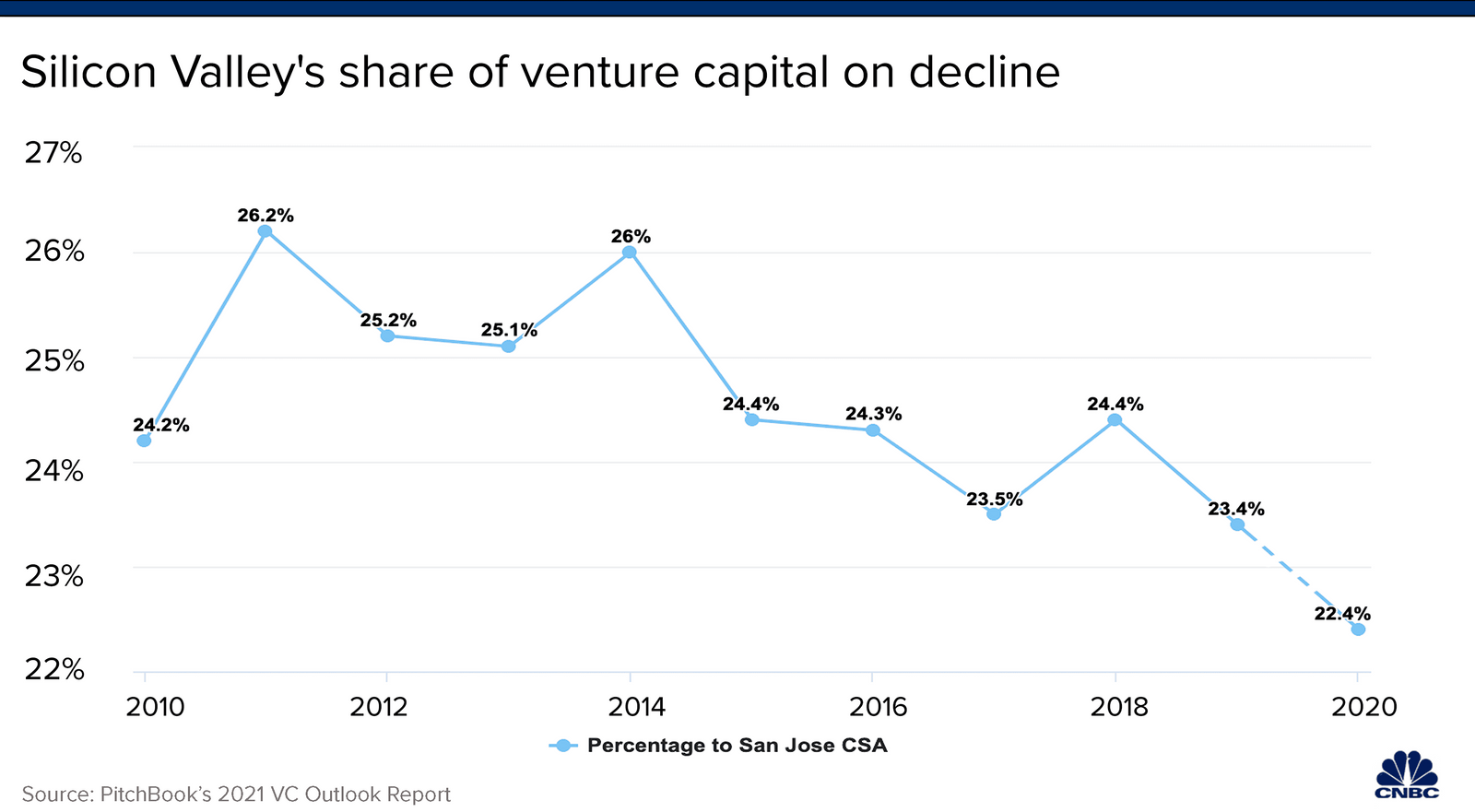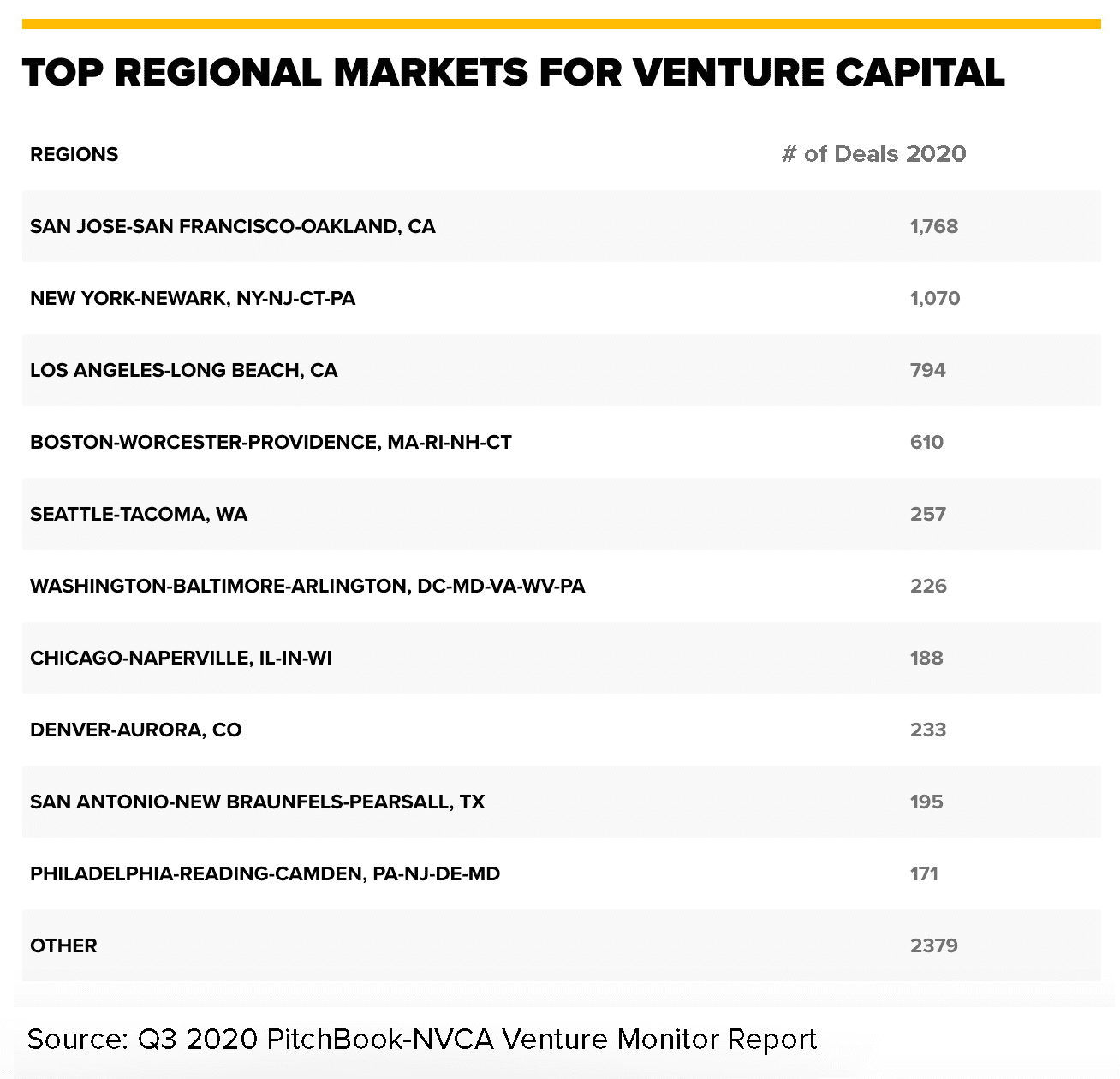Silicon Valley’s share of venture capital expected to drop below 20% for the first time this year
- Silicon Valley’s share of total VC count in the U.S. will fall below 20% for the first time in history, while other cities around the country grab larger amounts of equity capital for their home-grown innovators, according to PitchBook.
- The pandemic and the rise of remote work has fueled the trend as investors and entrepreneurs move to lower-cost cities.

The pandemic has upended the U.S. economy and it has also had a far-reaching effect on Silicon Valley, the venture capital industry and the entrepreneurial ecosystem in America.
According to PitchBook’s 2021 US Venture Capital Outlook report that was released late last month, the Bay area’s share of total VC count in the U.S. will fall below 20% for the first time in history, while other cities around the country grab larger amounts of equity capital for their home-grown innovators.
In 2020, $156.2 billion of venture capital was raised in the U.S., PitchBook reports. Of the total, 22.7% of the dealmaking occurred in the Bay Area, and 39.4% of deal value was invested in Bay area-headquartered companies.
"The Covid-19 pandemic and subsequent exodus from San Francisco will only exacerbate this trend," said PitchBook’s analyst Kyle Stanford. He notes that Silicon Valley’s share of venture capital deal count in the U.S. has fallen every year since 2006. The forces driving the continued shift: the rise of remote work during the pandemic, the high cost of living in the Valley, and the fact it’s become more expensive to finance start-ups in the Bay area.

Another factor is the fact that many investors have left — either temporarily working from home or relocating all together. For example, 8VC has made 70% of its investments in California-headquartered companies, yet it moved its own headquarters from San Francisco to Austin in November.
Second is the shift to secondary tech hubs. Big investors are moving to other cities such as Miami, Salt Lake City and Chicago, where great disruptive ideas are bubbling up. "Remote work makes it easier for talent to live outside of Silicon Valley and capital is following the trend," Cameron Stanfill, a senior analyst at PitchBook points out. "You no longer need to be down the street from your investor if you are an entrepreneur."
A PitchBook analysis revealed the hotspots attracting VC activity beyond the Valley. They are: Austin; Atlanta; Los Angeles-Long Beach; Boston corridor; New York metro area; Seattle-Tacoma; Washington D.C./Baltimore/Arlington area; San Antonio, Texas; Denver-Aurora area, Chicago and Philadelphia.

One company exemplifying the trend is Sana Biotechnology, a heavily funded start-up in Seattle that raised $435 million this summer in one of the largest venture financing deals in the life sciences industry and one of the biggest rounds on record in Seattle. The company’s valuation is now $2.77 billion. Investors include traditional VC funds such as ARCH Venture Partners, Flagship Pioneering and F-Prime Capital, as well as Canada Pension Plan Investment Board, Baillie Gifford, Alaska Permanent Fund, the Public Sector Pension Investment Board, Bezos Expeditions, GV, Omega Funds, Altitude Life Science Ventures, and multiple unnamed institutional investors.
Founded in 2019, the 250-person company has an ambitious goal of both repairing cells in the body (gene therapy), and replacing damaged cells (cell therapy). Sana is also aiming to innovate how gene and cell therapies are produced and distributed at scale. It’s led by several former executives from Juno Therapeutics, another Seattle biotech company that went public in 2014 and sold to Celgene for $9 billion in 2018.
Sana Biotechnology has been one of the beneficiaries of the boom in biotech and pharma venture capital investing. Last year, the sector attracted an all-time high of $27.4 billion in venture funding across 998 deals. The average deal size rose to $29.8 million; and the average valuation increased to $134.2 million.
On Wednesday, Sana filed paperwork for an IPO without a single drug in clinical trial. "This is significant because we have been seeing VC-backed biotechs going public earlier and earlier in the drug development cycle," said Josuha Chao a venture capital analyst at PitchBook.
In 2021, it is expected deal activity in this sector will exceed $20 billion for the second consecutive year, according to Pitchbook. In 2020, $27.4 billion of venture capital was raised by pharma/biotech start-ups in the U.S., PitchBook reports.
That’s in part from "ever-growing capital commitments from limited partners looking to break into the biopharma space, along with the recycling of profits and liquidity from the 2020 IPO market," Pitchbook noted in its report.
Hot sectors VCs are chasing
"Many start-ups in a wide range of fields – from drug discovery, immunotherapy, gene therapy, oncology, vaccine development and biomatics – are attracting a lot of interest," said Chao. "The pandemic has changed the purview of venture investors in this sector. They realize the importance of vaccines and infectious diseases and they are shifting some money to these areas as well."
Of the biotech and pharma deals that closed last year five were unicorns with valuations of more than $1 billion. Now market observers are waiting to see if more follow-on financing in 2021 will continue to fuel their astronomical growth. They are: Sana Biotechnology; Ginko BioWorks, a synthetic biology company that garnered a $70 million Series E round in May to push its valuation to $4.78 billion; Lyell, a cellular therapy company that raised $493 million in a series C round giving it a $2 billion valuation; Orca Bio, a medical therapy platform for many diseases that now has a $1 billion valuation after raising $192 million in a series D financing in June; and Zymergen, a biofacturer that raised $350 million in a series D round pushing its valuation to $1.75 billion.
PitchBook predicts that other hot sectors VCs will target in 2021 are: agtech; artificial intelligence and machine learning; cloudtech; enterprise health and wellness; fintech; foodtech; information security; insurtech; internet of things; mobility tech; retail health and wellness and supply chain technology.
These fields represent long-term megatrends that offer significant opportunity for investors as the pandemic has transformed the economy, how we work, shop and take care of our health.
According to Dharmesh Thakker, Battery Ventures’ general partner, a firm that has $8.9 billion of assets under management, "technology that is helping us accelerate into a digital economy is what many investors are looking at now. What is exciting is that entrepreneurs are innovating at a much faster rate than ever before. In the last decade we use to innovate every two years, today some innovation has been pushed to less than three months."
Looking ahead, Thakker thinks start-ups will be riding on the multi-cloud trend building businesses on top of the cloud which has huge market potential. He is targeting this technology as well as data and software analytics, enterprise software and cybersecurity.
He is bullish on data analytics. "The data ecosystem is so massive it should result in blockbuster IPOs this year," the venture capitalist said.
With offices on the famous Sand Hill Road in Menlo Park at the heart of Silicon Valley, Thakker can see firsthand the challenges the area faces now. "We see a significant exodus of people leaving the state of California and maintaining a talent pool is a significant issue for Silicon Valley. Many companies are hiring people around the world remotely to get around this issue."
Correction: This article has been corrected to reflect that in 2020 $156.2 billion of venture capital was raised in the U.S., PitchBook reports.








